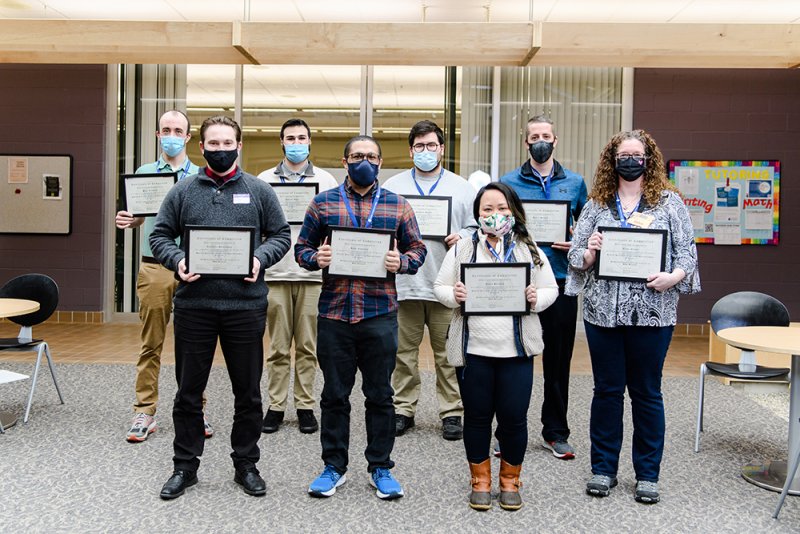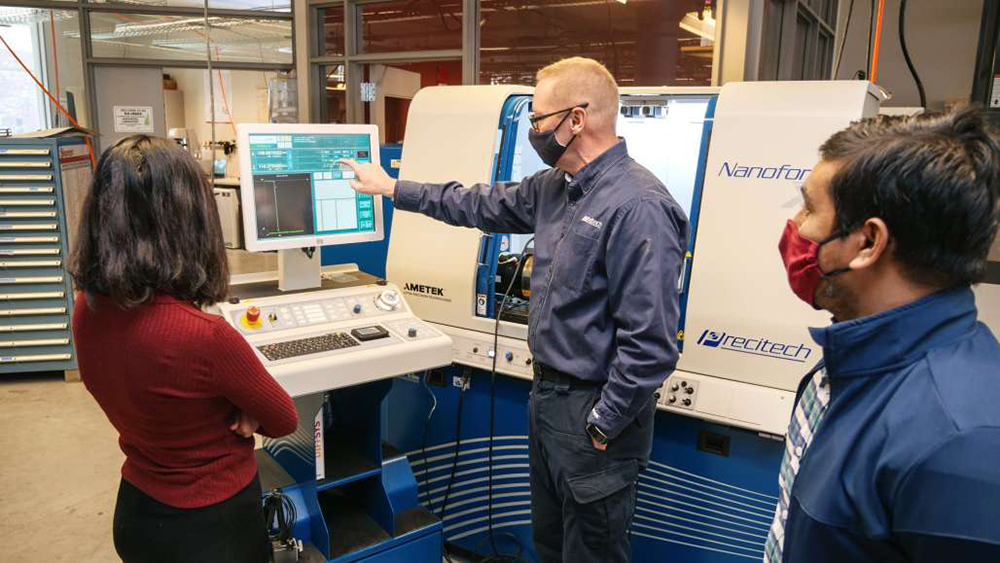 The second cohort of apprentices from BAE Systems. (Courtesy of ApprenticeshipNH)
The second cohort of apprentices from BAE Systems. (Courtesy of ApprenticeshipNH)
Precision inspectors are critical to BAE Systems, ensuring its products meet rigorous standards before they go out into the world. But the aerospace and defense company couldn’t find enough people for the role.
“We would invest a lot of time and energy into [training] contractors, and then we weren’t getting the loyalty factor,” says Judy Frank, the director for learning and development at the company’s Nashua-based Electronic Systems sector.
So, the company decided to build its own talent pool from scratch. In partnership with Nashua Community College, the company developed a two-year apprenticeship that puts new hires through the necessary schooling and certifications, then provides on-the-job training.
“The program’s been hugely successful for us,” Frank says. “We were able to hire 16 people over a six-month period.” Before that, “we weren’t able to hire any.”
Faced with an ongoing labor crunch, NH employers have teamed up with colleges to bolster their workforces, whether that’s targeted education for existing employees or training new ones.
Business leaders and educators say such collaborations—which include everything from skill-specific “micro-credentials” to multi-year apprenticeships—can help fill positions, increase staff retention and provide viable career pathways.
Higher-education institutions are “working with employers in ways we haven’t in the past to see what are the issues in their talent pipeline, and how do we get in there and plug in at different points?” says Jeremy Owens, associate vice president for university partnerships at Southern NH University in Manchester.
A Foot in the Door
Designed around a particular employer’s needs, an apprenticeship includes training and mentorship, relevant academic coursework and scheduled pay increases as the employee progresses.
“They’re growing their own workforce,” says Anne Banks, the youth apprenticeship manager at ApprenticeshipNH. “You can bring somebody in and train them specifically for you.”
A grant-funded initiative within the Community College System of NH, ApprenticeshipNH works with businesses to set up apprenticeships. The model has benefits for both workers and employers, Banks says. Because apprentices are paid employees, they don’t have to drop out of the workforce while taking classes, which many can’t afford. And when workers feel their employer is investing in their education, it can instill a sense of loyalty.
Richard Wahl was looking for a new career path after a few years as a truck driver when he came across the BAE apprenticeship. The company put him through five weeks of classes at Nashua Community College, where he earned two inspection certifications, then paired him with a mentor at a BAE facility in Nashua.
Six months in, Wahl says he is passionate about the work, and his colleagues have been helpful as he’s learned the ropes. “It’s a great opportunity for anybody that’s looking to get into the industry,” he says. “I think that it really is a stepping stone to get into a great career.”
For two Manchester-based hospitals, an apprenticeship program is helping address urgent staffing needs. At Catholic Medical Center, the pandemic exacerbated pre-existing staff shortages, forcing the health system to pay exorbitant amounts to temp agencies, says Karen Schoch, the director of organizational development. Across town, Elliot Health System was experiencing similar issues.
So, they decided to team up. In partnership with the community college system, they launched an apprenticeship program for medical assistants, patient service representatives and licensed nursing assistants. Schoch calls it “co-opetition.”
The goal is to expand the health care workforce by drawing new people to the industry, training them and reducing barriers to entry. Becky Marden, Elliot’s director for workforce development and experience, says the apprenticeship’s “earn and learn” model is one way to expand access and reach more candidates. “We heard loud and clear that one of the barriers for people going back to school … was that they had to work,” she says. “And so, they couldn’t stop their jobs, stop their income.”
Meeting Local Needs
Several years ago, at the direction of President Melinda Treadwell, faculty at Keene State College began looking into educational pathways in optics and precision manufacturing, an industry with a strong presence in the Keene area.
Early on, the college brought local industry leaders in for a roundtable to discuss their workforce needs, says Jim Kraly, an associate dean. “There was an opportunity for us to fill that gap.”
Keene State now offers classes in optics and ultra-precision manufacturing. Precitech, a Keene-based maker of ultra-precision machine tools, lent the college a diamond-turning lathe so students could learn on a state-of-the-art machine.

A Precitech employee demonstrates a diamond-turning lathe, which was lent to Keene State College to assistant professor Dr. Md Ahasan Habib, right. (Courtesy of Keene State College)
“Most of our workforce comes from the local area,” says Keith Kowalski, vice president and business unit manager of Precitech, which is owned by Ametek.
Keene State has packaged its optics and ultra-precision machining courses into a 12-credit micro-credential—a certification focused on a particular skill or topic.
Micro-credentials are catching on. The University of NH issues digital “badges” to those who complete programs on everything from culvert maintenance to the legal ins and outs of sports betting.
“The badging and the micro-credentialing [are] increasingly attractive to employees,” says Catherine Paden, provost and vice president for academic affairs at Franklin Pierce University in Rindge. It’s a way they can “demonstrate expertise or skillset development.”
Franklin Pierce creates customized trainings for employers and partners to offer employee tuition discounts for coursework.
Some organizations, she says, see educational opportunities as a way to not only grow their workforce’s skills, but offer an attractive benefit that encourages workers to stick around.
At White Mountains Community College (WMCC) in Berlin, workforce training programs have adapted to employers’ evolving needs. “These days, because [companies] have less time for employees to be away in the classroom, we’re spending more and more time going to them or offering courses that meet their employees’ schedules” on evenings or weekends, says Tamara Roberge, coordinator of workforce development and community education.
WMCC has also been exploring “train the trainer” programs, teaching longtime employees how to effectively pass on their expertise. For Schoch of Catholic Medical Center, there’s no “silver bullet” to the workforce crisis. But she encourages organizations that typically view themselves as competitors to consider joining forces on an issue that affects them all. “If you have that much of a workforce shortage and that much of a need,” she says, “pause for a minute and think about whether or not you could do things differently.”
